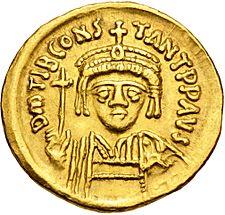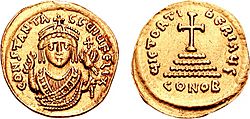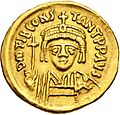Tiberius II Constantine facts for kids
Quick facts for kids Tiberius II Constantine |
|||||
|---|---|---|---|---|---|

Solidus of Tiberius II with the legend:
d n tib(erius) constant(inus) pp aug. |
|||||
| Byzantine emperor | |||||
| Augustus | 26 September 578 – 14 August 582 |
||||
| Predecessor | Justin II | ||||
| Successor | Maurice | ||||
| Caesar | 7 December 574 – 578 | ||||
| Born | Thrace | ||||
| Died | 14 August 582 Constantinople (now Istanbul, Turkey) |
||||
| Spouse | Ino Anastasia | ||||
| Issue |
|
||||
|
|||||
| Dynasty | Justinian | ||||
| Father | Justin II (adoptive) | ||||
Tiberius II Constantine (died 14 August 582) was a powerful ruler of the Eastern Roman Empire, also known as the Byzantine Empire. He ruled from 574 to 582. Tiberius became important in 574 when the emperor Justin II named him caesar and adopted him. A caesar was like a prince or chosen heir.
In 578, Justin II, who was very ill, made Tiberius augustus, meaning he became co-emperor. Less than two weeks later, Justin II died, and Tiberius became the sole emperor. He took the name "Constantine" and ruled until his death.
Contents
Early Life and Career
Tiberius was born in Thrace in the mid-500s. He started his career as a notarius, which was a secretary or clerk. Around 552, he met Justin II, who would later become emperor. They became close friends.
Thanks to Justin, Tiberius was promoted to Comes excubitorum, a commander of the imperial guards. He held this position from about 565 to 574. He was there when Justin became emperor in 565.
Emperor Justin II stopped paying tribute to the Avars, a powerful group. In 569, Justin made Tiberius a top military commander, Magister utriusque militiae, to deal with the Avars. Tiberius tried to make a deal, letting the Avars settle on Roman land. But Justin rejected the agreement, wanting hostages from the Avar leader's family. This led to war.
War with the Avars (570)
In 570, Tiberius led his army and defeated the Avars in Thrace. He returned to Constantinople after this victory. However, in a later battle, Tiberius's army was defeated, and he barely escaped.
He then agreed to a truce and helped Avar messengers meet with Justin. When the Avar messengers were robbed on their way back, Tiberius found the thieves and returned their stolen goods.
In 574, Emperor Justin II became mentally ill. His wife, Empress Sophia, asked Tiberius to help manage the empire. The empire was fighting the Persians in the east and dealing with a terrible plague.
To gain some peace, Tiberius and Sophia made a one-year truce with the Persians. It cost them a lot of money. On December 7, 574, Justin, in a clear moment, named Tiberius Caesar and adopted him. Tiberius added "Constantine" to his name. Even though he was now Caesar, he was still under Justin's rule. Sophia wanted to keep her power and kept a close eye on Tiberius until Justin died in 578.
Becoming Caesar (574–578)
The day after Tiberius became Caesar, the plague ended. This gave him more freedom to act. Tiberius chose a different path from Justin. He started spending the money Justin had saved to protect the empire's borders and win over the people.
It is said that Tiberius found two large treasures. He gave this money to the poor, which made Empress Sophia unhappy.
Besides giving generous gifts, Tiberius also lowered taxes on wine and bread. He continued the popular ban on selling government positions. He also made a deal with the Avars, paying them money each year. In return, the Avars agreed to protect the Danube border. This allowed Tiberius to move troops to the east for the war against the Persians.
In 575, Tiberius began moving armies from the west to the eastern provinces. To buy more time, he agreed to a three-year truce with the Persians, costing more money. This truce did not include the area around Armenia.
Tiberius also sent help to Italy to fight the Lombard invasion. He helped save Rome and allied with the Franks. However, the Roman general in Italy was defeated, and more land was lost.
The Persian emperor attacked Armenia in 576. Tiberius sent his general, Justinian, to push the Persians back. The Romans went deep into Persian land. In 577, Justinian was defeated in Armenia, and the Romans had to retreat. Tiberius then replaced Justinian with Maurice, who would later become emperor.
During the truce, Tiberius made his eastern army stronger. He brought in troops from the west and hired new soldiers, creating a large force of about 15,000 troops.
Throughout 577 and 578, Tiberius avoided other conflicts to focus on the Persian war. He tried to keep peace between different Christian groups. He also paid the Lombard leaders to keep them divided. When the Slavs invaded, he used Avar armies to attack them and make them leave.
So, when the Persians invaded in 578, Tiberius's general, Maurice, was ready. Maurice invaded Persian lands, sacking towns and forcing the Persians to defend their own territory. During this time, Emperor Justin II finally died on October 5, 578.
Reign as Augustus (578–582)
On September 26, 578, Tiberius was made Augustus by the dying Justin. He used this chance to give away a lot of gold, a practice he continued every year of his four-year reign.
Empress Sophia, Justin's widow, tried to keep her power by marrying Tiberius. But he refused because he was already married to Ino. When Tiberius first became Caesar, Sophia had not allowed Ino and her children to live in the imperial palace. They had to live nearby.
But once Tiberius became Augustus, he moved his family into the palace. He also renamed Ino to Anastasia, which made Sophia angry. Sophia then secretly planned with General Justinian to overthrow Tiberius. The plan failed, and Sophia lost much of her influence. Tiberius forgave Justinian.
The success against the Persians allowed Tiberius to focus on the west again. In 579, he sent money and troops to Italy to strengthen Ravenna. He also made an alliance with a Visigothic prince in Spain and defeated rebellious groups in North Africa. He even got involved in the affairs of the Franks in Gaul, a region that had not had much contact with the empire for a long time.
However, the empire was stretched too thin. In 579, while Tiberius was busy elsewhere, the Avars attacked Sirmium. At the same time, the Slavs began moving into the Balkans and Greece. Tiberius could not stop them because the war with the Persians was still his main focus. Also, the army in the East was restless because they had not been paid.
In 580, General Maurice launched a new attack against the Persians. The next year, he invaded Persian Armenia. But a Persian counter-attack forced him to retreat. By 582, the Persian war seemed endless. Tiberius had to make a deal with the Avars, paying them money and giving them the important city of Sirmium. The Slavs continued to move south, even reaching Athens.
A new Persian invasion was stopped in June 582. But by then, Tiberius was dying, possibly from bad or poisoned food.
As he was dying, Tiberius named two heirs. Each married one of his daughters. Maurice married Constantina, and Germanus married Charito. It seems Tiberius wanted to divide the empire into two parts. Maurice would get the eastern parts, and Germanus the western parts. But this plan was never carried out. On August 13, 582, Tiberius made Maurice an Augustus.
Tiberius died the next day, August 14, 582. His last words to Maurice were: "Let my sovereignty be delivered to thee with this girl. Be happy in the use of it, mindful always to love equity and justice."
Character and Legacy
Tiberius was from a Latin-speaking part of Thrace, but he is known as one of the first "Greek-speaking Caesars." He was described as tall, handsome, and regal. He was known for being kind and generous as both a person and a ruler.
Unlike the emperor before him, he was generally fair to different Christian groups. He also spent a lot of money on building projects, especially expanding the Great Palace of Constantinople.
Some historians, like Edward Gibbon, thought Tiberius II was a very good emperor. They said he was humane, just, and brave. He was kind to his people and victorious in war. He even helped many war captives return home.
However, other historians, like John Bagnall Bury, had a different view. They believed that while Tiberius started well by lowering taxes, he became too extravagant. He spent too much money on soldiers and gifts for many professions. This quickly emptied the treasury. By the end of his reign, the empire was almost bankrupt. So, when Maurice became emperor, he found the treasury empty.
Family
Tiberius was first engaged to Ino's daughter. But after her daughter and husband died, Tiberius married Ino. She took the name Anastasia in 578 when he became emperor.
They had three children. One died before Tiberius became Caesar. His two daughters, Constantina and Charito, both outlived him. Constantina married Tiberius's successor, Maurice, and Charito married Germanus.
Images for kids
| Regnal titles | ||
|---|---|---|
| Preceded by Justin II |
Byzantine emperor 578–582 with Justin II (578) Maurice (582) |
Succeeded by Maurice |
See also
 In Spanish: Tiberio II para niños
In Spanish: Tiberio II para niños
 | Misty Copeland |
 | Raven Wilkinson |
 | Debra Austin |
 | Aesha Ash |




